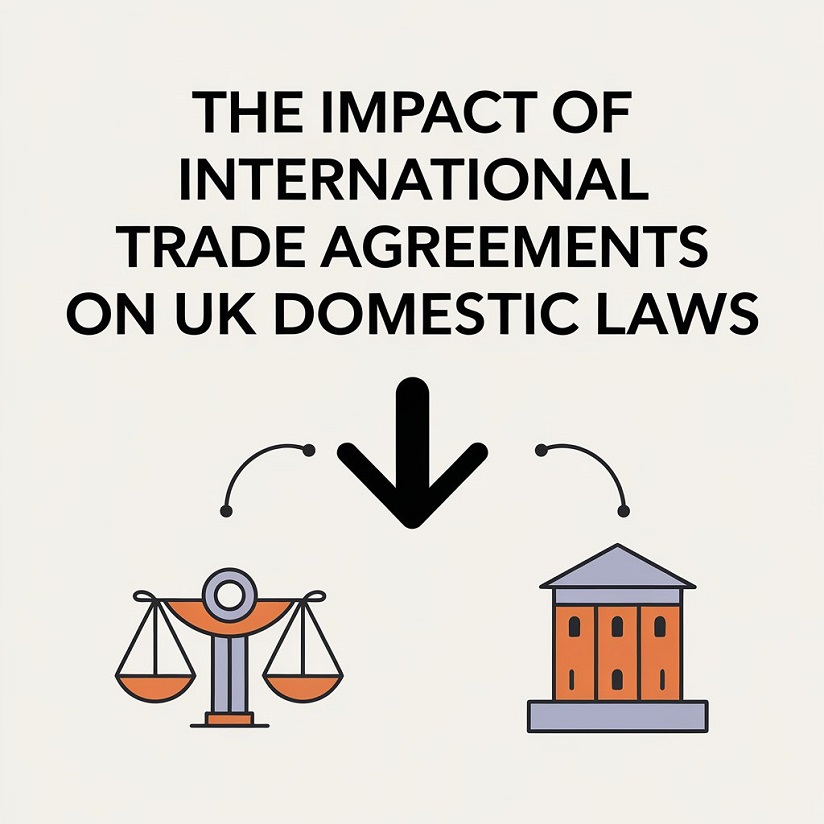International trade agreements play a pivotal role in shaping domestic legal frameworks, particularly in a globalized economy where interconnectedness is the norm. For the United Kingdom, the influence of such agreements has grown more pronounced post-Brexit, as the country establishes new trade relationships outside the European Union. This article explores the impact of international trade agreements on UK domestic laws, highlighting key areas such as regulatory changes, sovereignty challenges, and economic implications.
Understanding International Trade Agreements
International trade agreements are legal frameworks between two or more countries designed to facilitate trade and investment. These agreements often reduce tariffs, standardize regulations, and promote economic cooperation. The UK’s participation in agreements such as the Comprehensive and Progressive Agreement for Trans-Pacific Partnership (CPTPP) and the UK-Australia Free Trade Agreement exemplifies its efforts to secure global trade partnerships.
Key Impacts on UK Domestic Laws
1. Regulatory Alignment
Trade agreements often require alignment of domestic laws with international standards. For instance, agreements may necessitate changes in regulations related to product safety, environmental standards, or labor laws. While this ensures smoother trade, it can also lead to adjustments in UK law to comply with international obligations, potentially overriding pre-existing domestic frameworks—a key area often explored in law essay help UK discussions.
2. Intellectual Property Rights
Trade agreements often include provisions for intellectual property (IP) protection, which can necessitate updates to domestic IP laws. For example, commitments under agreements with the United States or other nations may involve extending copyright durations or introducing stricter patent protections, impacting industries reliant on innovation.
3. Sovereignty Challenges
A recurring debate is the tension between maintaining sovereignty and adhering to international commitments. By entering trade agreements, the UK agrees to abide by rules set jointly with partner countries, which may limit the UK’s legislative independence in certain areas.
Example: Dispute resolution mechanisms like Investor-State Dispute Settlement (ISDS) clauses can allow foreign investors to challenge UK policies, raising concerns about domestic legal autonomy.
4. Environmental and Labor Standards
International agreements often include commitments to uphold high environmental and labor standards. The UK’s trade agreements frequently involve clauses requiring compliance with green energy policies and fair labor practices, pushing domestic laws toward sustainability and ethical governance.
However, these obligations can create friction with domestic stakeholders who may view such commitments as restrictive or costly for local businesses.
Post-Brexit Challenges and Opportunities
Post-Brexit, the UK regained the ability to negotiate its own trade agreements, providing opportunities to tailor deals to national interests. However, this independence also brings challenges:
- Complexity in Negotiations: The need to harmonize agreements with domestic laws without compromising economic or legal priorities.
- Potential Conflicts: Balancing international commitments with the need to protect local industries and communities.
For instance, while pursuing deals with non-EU countries, the UK must also navigate its commitments under the Northern Ireland Protocol, which adds layers of complexity to its domestic legal adjustments.
Economic Implications of Legal Changes
The legal changes brought about by trade agreements can have far-reaching economic effects:
- Market Access: Aligning UK laws with trade partners’ standards can open new markets, boosting exports.
- Competitiveness: Domestic businesses must adapt to new legal requirements, potentially enhancing their global competitiveness.
- Consumer Impact: Changes in tariffs and regulations can influence product availability and pricing, directly affecting UK consumers.
Conclusion
International trade agreements significantly impact UK domestic laws, driving changes in regulations, intellectual property, environmental standards, and more. While these agreements offer economic opportunities, they also pose challenges to legislative sovereignty and domestic policy priorities. For the UK, striking a balance between global commitments and national interests remains crucial in navigating the evolving landscape of international trade.
By carefully managing these agreements, the UK can maximize the benefits of globalization while safeguarding its legal and economic frameworks.







